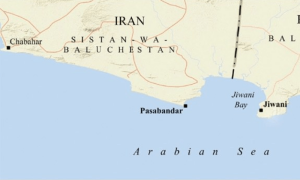KARACHI: “I can feel the joy they have been experiencing since being shifted to this big enclosure more than a year ago. Now, they often flap their ears and produce calls that indicate their happiness,” Raju Nashman, the elephant caretaker at the Safari Park, tells Dawn how living in a larger area has positively affected the behaviour of these large mammals, earlier kept in a smaller space.
The two pairs of elephants that were brought to Karachi from Tanzania about six years ago had been confined to small spaces at the zoo and Safari for four years. While one pair at the Safari was shifted to a large enclosure spread over 1.5 acres over a year ago, the other at the Karachi Zoological Garden was provided with an area that still required a lot of improvement.
Raju, with 18 years of experience in zoo-keeping, has been with the animals since their arrival. “There were days when I used to sleep with them at night. But that routine has changed with my marriage two years ago and now I leave by 8.30pm,” he points out.
Luckily for the animals named Malika and Sonu, the Safari administration has not only provided a large unpaved area to the animals but has also kept it green by planting trees and grasses, a development seen at a government-run facility for captive animals for the first time in decades
The long trench surrounding the grilled enclosure keeps visitors at bay while they can enjoy seeing the large animals strolling through the lawn. Another important feature of the facility is that it provides animals with the ‘luxury’ to forage, an aspect that government facilities for captive animals usually don’t offer.
“I feel proud to be associated with these majestic animals that are so sensitive, intelligent and loving. My stick is not meant to beat them but to create a feeling of fear so they remain disciplined. I look at them as my children and I can do anything for them,” Raju says with confidence.
The animals aged 13 (female) and 11 years (male) begin their day with eating 50kg bananas followed by 30kg carrots and 5kg rice rolled in 5kg jiggery (gurr) at noon. They are offered 35kg watermelons in the afternoon and around 20 to 30kg of sweet potatoes at 4pm.
“Their dinner comprises 100kg sugarcane, 70kg grass and 70kg corn leaves. The sleep over the leftover grass later in the night,” says Raju.
The animals are free to roam for a few hours in the morning as well as in the evening. As the sun sets, they are taken back to their grilled cages and chained. “If we don’t chain them, they can act like a wild beast. However, they are so innocent and trained enough that they themselves extend their feet towards us when it is time to go inside,” he said, adding that the chain had a plastic covering that protects their feet.
Unfortunately, the pond area is shallow and doesn’t allow the animals to enjoy and beat the heat in the hot summer days. “Actually, we don’t have a drainage line here so we were bound to make the area shallow,” explains Dr Kazim Hussain, additional director Safari.
According to Dr Hussain, the enclosure was built at a cost of Rs20m and is so far the best facility offered to captive animals in Karachi. The administration, he says, is implementing an irrigation project under which all Safari enclosures would get a separate water supply line.
“This would help making the area green and animal-friendly,” he adds.
Addressing the challenges the African elephant species poses in the coming years as they become sexually mature and aggressive, he said: “We are managing well right now. With the large area that we have provided to animals and the remarkable association they have with their caretakers, we hope to successfully manage that period. The female has started showing signs of sexual maturity, though the male species hasn’t so far,” he said.
It is important to know that the management of zoo elephants has been acknowledged as a major problem across the world on account of their specific physical, social and psychological needs. Some zoos have even closed down their elephant exhibits.
Elephants, according to information available on the net, require vast spaces to roam, socialise and express their natural behaviour. They are highly social animals who, in the wild, live in matriarchal herds, forage for fresh vegetation, play, bathe in rivers, travel as far as 30 miles every day, and are active for 18 hours per day.
Zoos, it is said, rob elephants of their most basic needs, including social companionship and adequate space to exercise. They are kept in unnaturally small groups with callous disregard for the special bonds of friendship between elephants.
This explains why captivity-induced health problems have been found to be the leading cause of death of elephants in zoos, as they are dying decades short of their expected life span.
Published in Dawn, May 11th, 2015
On a mobile phone? Get the Dawn Mobile App: Apple Store | Google Play




















































